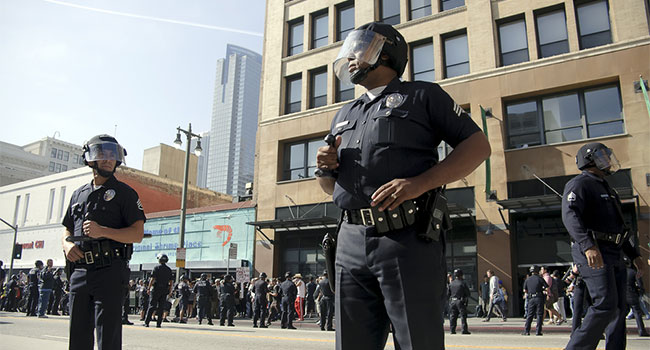
Los Angeles Police Plan to Review Body Camera Footage for Instances of ‘Biased Policing’
The new approach to reviewing officers’ footage comes as researchers question how much impact body cameras have had on police behavior.
- By Haley Samsel
- Nov 08, 2019
Body cameras worn by Los Angeles police officers record over 14,000 interactions each day. Now, the department is implementing a policy to review random recordings to check if officers are following certain guidelines in how they interact with residents.
LAPD Chief Michel Moore reached an agreement with the Los Angeles Police Protective League, a union that represents police officers, to allow officers to inspect footage that does not involve arrests or use of force, The Los Angeles Times reported.
The goal is to allow department supervisors to determine if some cops need additional training to address issues with biased policing. Footage will be reviewed to ensure that officers explain their actions when they stop people and are not rude, Moore told the Times.
The “vast majority” of inspections will likely show officers acting consistent with the department’s expectations, Moore added.
“We can improve the public’s trust,” Moore said on Wednesday. “It’s an opportunity to make sure people are being treated fairly.”
The new review policy is a change from the department’s previous practices, where supervisors only reviewed body camera footage if it involved an arrest or officers’ use of force. Shane Murphy Goldsmith said she was happy to see the department acknowledge complaints of biased policing and adopt a “comprehensive” approach to addressing the issue.
“[The plan to inspect] video footage to identify trends, develop training and hold officers accountable to the highest standard of fair and unbiased policing is a big step forward,” Goldsmith said.
Since field-testing body cameras in 2014, the LAPD has deployed more than 7,000, according to the Times. The department’s new approach can also be seen as a response to criticisms that body cameras have not had a substantial impact on the prevalence of biased policing. One 2019 study, conducted by researchers at the Center for Evidence-Based Crime Policy at George Mason University, found that body cameras did not have a consistent or significant effect on either officer behavior or public views of police.
That’s because body cameras cannot be seen as an “easy panacea for improving police performance, accountability and relationships with citizens,” the researchers wrote. Police and researchers need to address how body-worn cameras “can be used in police training, management and internal investigations to achieve more fundamental organizational changes,” the George Mason researchers said.
That seems to be the idea behind the policy change in Los Angeles. Tom Saggau, a police union spokesperson, said that his organization stands behind the new inspection policy and that police leaders can discipline officers for misconduct captured on their cameras.
“If they identify misconduct, then the chips will fall how they fall,” he said.
About the Author
Haley Samsel is an Associate Content Editor for the Infrastructure Solutions Group at 1105 Media.